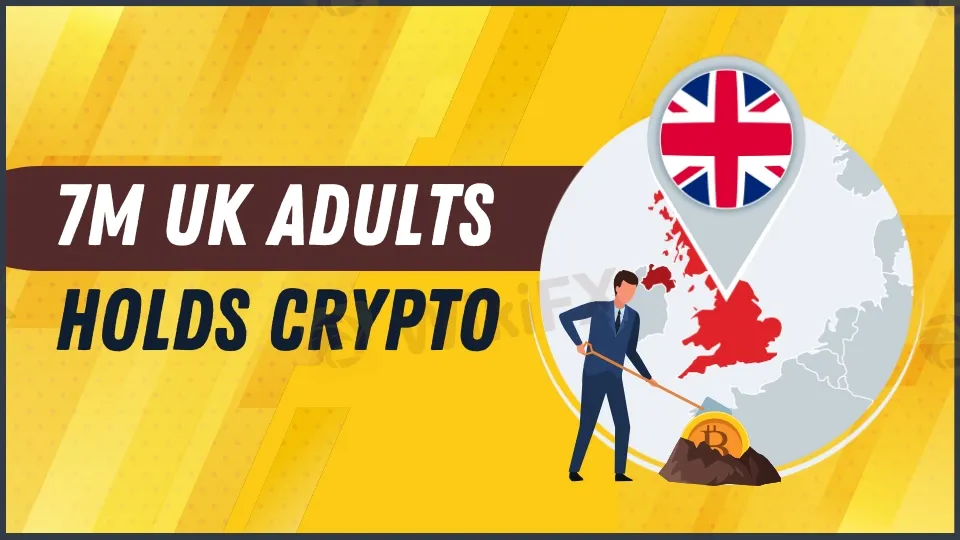简体中文
繁體中文
English
Pусский
日本語
ภาษาไทย
Tiếng Việt
Bahasa Indonesia
Español
हिन्दी
Filippiiniläinen
Français
Deutsch
Português
Türkçe
한국어
العربية
FCA Plans Robust Crypto Regulations as 7M Adults Own Crypto
Abstract:With 7M UK adults holding cryptocurrency, the FCA outlines a robust plan to regulate crypto markets, stablecoins, and staking by 2026, aligning with global trends.

The Financial Conduct Authority (FCA) in the United Kingdom is preparing to develop a comprehensive regulatory framework for cryptocurrencies by 2026, reflecting the rising acceptance of digital assets throughout the country. According to a recent FCA-commissioned survey, cryptocurrency ownership has increased by 4% over the last two years, with an estimated 7 million U.K. adults now owning crypto.
To address this developing industry, the FCA has issued a thorough road map detailing its regulatory agenda. It intends to provide discussion papers on crucial issues such as market abuse and transparency rules by the end of 2024. In 2025, the agency will investigate stablecoins, trading platforms, staking, cryptocurrency lending, and prudential exposure. These activities seek to generate final policy declarations that will pave the way for the framework's implementation by 2026.
This approach is consistent with the UK government's larger attempts to regulate the crypto business. Tulip Siddiq, Economic Secretary, has stated intentions to present draft laws governing cryptocurrencies, stablecoins, and staking by early 2025. This is the first comprehensive crypto policy framework introduced by the Labour administration, which entered power in July.

Siddiq stressed that a uniform regulatory approach would streamline supervision and better meet the interests of the business. The proposed framework would replace the present laws regulating stablecoins under the UK's payment services legislation, ensuring that they reflect their position as an asset-backed digital currency. Furthermore, the government intends to clarify the legal categorization of staking, which involves users locking up tokens in order to collect rewards. Siddiq agrees with industry requests to define staking as a technological service rather than a collective investment plan, which would subject it to harsher rules.
Matthew Long, the FCA's director of payments and digital assets, remarked, “We're committed to working closely with the Government, international partners, industry, and consumers to help us get the future rules right.”
The UK's emphasis on cryptocurrency regulation is fueled in part by increased competition from other areas. The European Union, for example, is aiming to implement its own Markets in Cryptoassets (MiCA) regulations by the end of 2024. Industry executives have warned that if the UK does not move quickly to create clear norms, it risks losing its competitive advantage.
Final ThoughtsThe FCA's ambitious proposal marks a critical time for the U.K. crypto sector. The government hopes to promote innovation while protecting consumers by resolving industry concerns and providing a consistent framework. As global competition heats up, these steps might propel the United Kingdom to the forefront of Bitcoin innovation and regulation.

Disclaimer:
The views in this article only represent the author's personal views, and do not constitute investment advice on this platform. This platform does not guarantee the accuracy, completeness and timeliness of the information in the article, and will not be liable for any loss caused by the use of or reliance on the information in the article.
Read more

Webull Canada Expands Trading Hours with Options Trading
Webull Canada now offers extended trading hours from 4 a.m. to 5:30 p.m. ET, plus options trading. Gain flexibility and manage risk in an ever-changing market.

Robinhood Launches Ethereum Staking with 100% Rewards Match
Robinhood Crypto debuts Ethereum staking for European users with a 100% earnings match up to €10,000. Simplified staking makes earning rewards effortless.

BSP Rolls Out Stricter Rules for Virtual Asset Providers
The Philippines enforces new virtual asset reporting rules starting January 2025, mandating 13 comprehensive reports from VASPs to ensure transparency and security.

Kraken Closes NFT Marketplace Amid New Product Focus
Kraken shuts down its NFT marketplace to focus on new products and services, citing the NFT market downturn. Resources shift to stablecoins and institutional solutions.
WikiFX Broker
Latest News
Saxo & Portuguese Bank Partnership
SEC Fines Broker-Dealers $275K for Incomplete SAR Filings
Elon Musk Warns of Imminent US Bankruptcy | Bitcoin Retreats from $100K
WikiEXPO Global Expert Interview: Advanced Practices and Insights in Financial Regulation
Justin Sun Invests $30M in Trump-Backed World Liberty Financial
Kraken Closes NFT Marketplace Amid New Product Focus
Robinhood Launches Ethereum Staking with 100% Rewards Match
Lured by False Promises: Malaysian Driver Lost RM218K to an Investment Scam
FTX Sets March 2025 Timeline for Creditor Payouts: What It Means for Investors
What is an Economic Calendar? How it works
Currency Calculator



